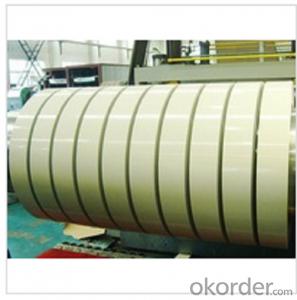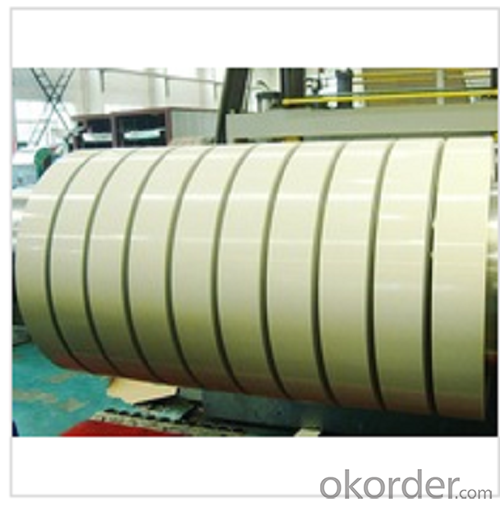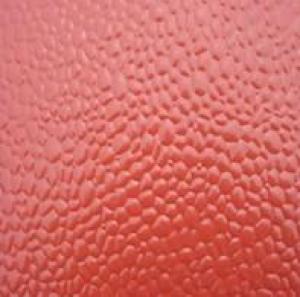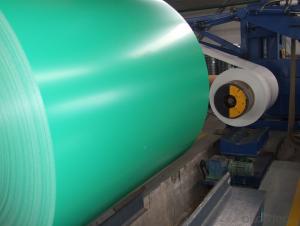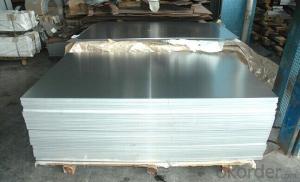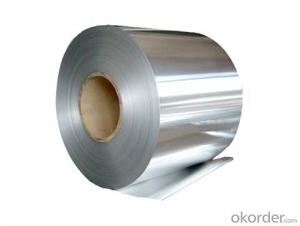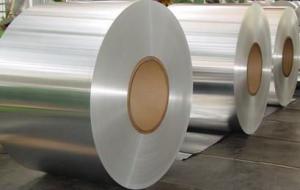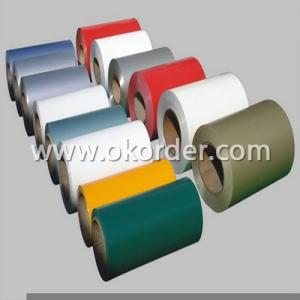5182 Color Coated Aluminum Sheet Coil Prices
- Loading Port:
- China main port
- Payment Terms:
- TT OR LC
- Min Order Qty:
- 10 m.t
- Supply Capability:
- 1000 m.t/month
OKorder Service Pledge
OKorder Financial Service
You Might Also Like
Specification
The Specification of Coated Aluminium Foil
coated emboss aluminum coil/metal roofing
| |
Aluminum Temper and Grade | Alloys: 1100, 1050, 1100, 3003, 3105, 8011 in a range of standard Temper: O-H112 |
Widths | Max up to 1600mm |
Thickness | 0.02-3.0mm |
Coating | PE or PVDF |
| Color | AS per the RAL |
Weight | 1.5-4MT/Coil as per your request |
Packing Detail | Wooden pallet either eye to side or eye to sky
|
Application | Building material such as metal ceiling, roofing, wall cladding panel; Automobiles, etc. |
PVDF Coated:
Coated Aluminum Coil features with super durability and weather resistance,and better properties to anti-acid,anti-alkali,keeping more than 15 years without fading in using as external wall cladding.
The Main Features of Aluminium Coated Coil:
High quality with competive prices.
Wide product range of choice.
We are specific manufacture and control.
The Images of Aluminium Coated Coil:
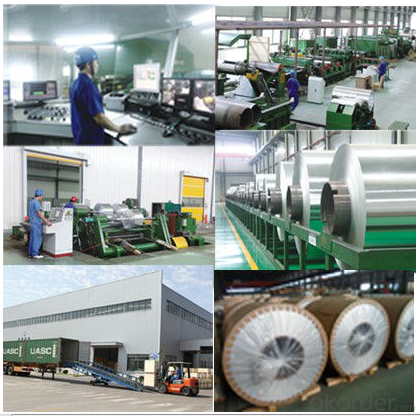
FAQ:
Q: Can you provide free samples?
A: Yes, free samples will be sent to you on freight at destination.
Q: Can I get your latest catalogue?
A: Yes, it will be sent to you in no time.
Q: What is the MOQ?
A: 5 tons
Q: What are your payment terms?
A: We accept L/C,T/T, West Union,etc.
- Q: What are the different grades of aluminum used in coil manufacturing?
- The different grades of aluminum commonly used in coil manufacturing include 1100, 3003, and 5052. These grades vary in their chemical composition, mechanical properties, and suitability for various applications.
- Q: Are aluminum coils suitable for solar reflectors?
- Yes, aluminum coils are suitable for solar reflectors. Aluminum is a widely used material for solar reflectors due to its high reflectivity and durability. It has a reflective surface that can efficiently redirect the sunlight onto the desired target, such as a solar panel or collector. Additionally, aluminum coils are lightweight and easy to shape, making them ideal for creating curved or angled reflector surfaces. The reflective coating on aluminum coils can withstand harsh weather conditions and provide long-lasting performance. Overall, aluminum coils are an excellent choice for solar reflectors due to their reflectivity, durability, and versatility.
- Q: How do you store aluminum coils to prevent damage?
- To store aluminum coils and prevent damage, there are several important steps you can follow. First, it is crucial to ensure that the storage area is clean, dry, and free from any moisture or humidity. This is because moisture can lead to corrosion and damage the aluminum coils over time. Second, you should store the coils in an upright position, preferably on pallets or racks, to prevent any bending or warping. By keeping them upright, you minimize the risk of coil deformation and maintain their shape for future use. Furthermore, it is advisable to cover the coils with a protective material such as plastic or tarp to shield them from dust, dirt, and other contaminants. This protective layer will also isolate the coils from any potential chemical exposure that could accelerate corrosion. Additionally, it is essential to handle the coils with care during storage, as rough handling or dropping them can lead to dents or scratches. To prevent any physical damage, use appropriate lifting equipment, such as forklifts or cranes, when moving or stacking the coils. Lastly, it is recommended to periodically inspect the coils during storage to ensure there are no signs of damage or corrosion. Regular visual checks will allow you to identify any issues early on and take necessary steps to prevent further damage. By following these storage practices, you can effectively prevent damage to aluminum coils, ensuring their longevity and preserving their quality for future use.
- Q: What are the acoustic properties of buildings using aluminum coils?
- The acoustic properties of buildings using aluminum coils can be influenced by various factors. Aluminum coils are commonly used in the construction industry for roofing, cladding, and insulation purposes. From an acoustic perspective, these properties can have both positive and negative impacts on the sound transmission within a building. One of the primary acoustic benefits of using aluminum coils is their ability to act as a reflective barrier for sound waves. When properly installed, aluminum coils can help prevent sound from penetrating through walls or ceilings, resulting in a reduction in external noise sources. This can be particularly beneficial in areas with high levels of noise pollution, such as urban environments or near busy roads. Additionally, aluminum coils can contribute to the overall sound insulation of a building. Due to their material properties, they can provide a certain level of soundproofing, especially when combined with other insulation materials. This can help maintain a comfortable and quiet indoor environment, allowing for improved concentration, productivity, and overall well-being of occupants. However, it is important to note that the acoustic properties of buildings using aluminum coils can also have limitations. Aluminum is a lightweight material compared to alternatives like concrete or brick, which means it may not provide as much mass to block sound transmission. Therefore, in situations where high sound insulation is required, additional measures such as double glazing, acoustic seals, or thicker wall constructions may be necessary. Furthermore, the use of aluminum coils can also affect the sound reverberation within a space. Due to their smooth and reflective surface, aluminum coils can potentially cause sound waves to bounce off, leading to increased echo and reverberation time. This can negatively impact speech intelligibility and acoustic comfort, especially in larger open-plan areas or rooms with high ceilings. Overall, while aluminum coils can offer certain acoustic advantages such as sound reflection and insulation, it is important to consider the specific requirements of each building project. Consulting with acoustic engineers or professionals can help ensure that the appropriate measures are taken to optimize the acoustic properties of buildings using aluminum coils, and to address any potential limitations.
- Q: What is the balanced chemical equation for aluminum and cobalt?That is all the information that the question gives. If you could help me out, I would really, really appreciate it.
- That's pretty sparse. Perhaps the question is referring to a single replacement reaction. Aluminum is above cobalt in the activity series, which allows us to predict that aluminum metal will reduce cobalt ions, while aluminum is oxidized. This occurs as long as there is an ion present which will react with the aluminum oxide layer on the surface of aluminum. This passivating Al2O3 layer keeps aluminum metal from reacting. The presence of chloride ions will break down the passivating layer allowing the aluminum metal below to react. Al2O3(s) + 6H+ + 8Cl- -- 2[AlCl4]- + 3H2O(l) 2Al(s) + 3Co2+ -- 2Al3+ + 3Co(s)
- Q: Can aluminum coils, which are typically used for industrial purposes, be utilized for baking pizza?
- <p>Aluminum coils, commonly used in industrial applications, are not recommended for baking pizza. While aluminum is a good conductor of heat and can be used in baking, aluminum coils are often too thick and not designed for direct contact with food. They may also contain coatings or treatments unsuitable for food. Instead, use aluminum foil or a pizza stone designed for baking to ensure food safety and even heat distribution.</p>
- Q: What is the coefficient of thermal expansion of aluminum coils?
- The coefficient of thermal expansion of aluminum coils is typically around 23 x 10^-6 per degree Celsius.
- Q: What are the different types of surface treatments for corrosion resistance?
- Various materials can benefit from different surface treatments to enhance their resistance to corrosion. These treatments can be grouped into mechanical, chemical, and electrochemical methods. 1. To improve corrosion resistance, mechanical surface treatments involve physically altering or modifying the material's surface. Shot peening, sandblasting, and polishing are common methods. Shot peening induces compressive stresses by bombarding the material with small metal pellets, preventing corrosion. Sandblasting removes existing corrosion and creates a clean, smooth surface by blasting it with abrasive particles. Polishing, using abrasives, creates a smooth, reflective surface that reduces the chances of corrosion initiation. 2. Chemical surface treatments involve applying a chemical solution or coating to create a protective layer against corrosion. Chromating, for example, applies a chromate conversion coating that acts as a barrier against corrosion and improves adhesion for subsequent paint or coating layers. Anodizing, commonly used for aluminum surfaces, creates a thick oxide layer that enhances corrosion resistance and can provide decorative finishes. Other chemical treatments, like phosphating, passivation, and galvanizing, use specific chemical solutions or coatings to protect against corrosion. 3. Electrochemical surface treatments utilize electrochemistry principles to create a protective layer. Electroplating involves depositing a thin layer of a more corrosion-resistant material, such as zinc, nickel, or chromium, onto the base material's surface. Anodic protection connects a sacrificial anode to the material, causing the anode to corrode instead of the material itself. This method is commonly used for underground structures and pipelines. The choice of surface treatment for corrosion resistance depends on factors like the material, intended application, and desired level of protection. It is crucial to consider factors like cost, environmental impact, and performance requirements when selecting the appropriate treatment, as each method has its advantages and limitations.
- Q: Aluminum roll width 750mm, single layer thickness 6.5mm, diameter 400mm., how to calculate the weight of the aluminum roll?
- You can use the outside diameter, the inner diameter and the width to get the volume. You know the density and volume, and then you can find the weight naturally
- Q: Are aluminum coils resistant to saltwater corrosion?
- Yes, aluminum coils are resistant to saltwater corrosion.
Send your message to us
5182 Color Coated Aluminum Sheet Coil Prices
- Loading Port:
- China main port
- Payment Terms:
- TT OR LC
- Min Order Qty:
- 10 m.t
- Supply Capability:
- 1000 m.t/month
OKorder Service Pledge
OKorder Financial Service
Similar products
Hot products
Hot Searches
Related keywords
